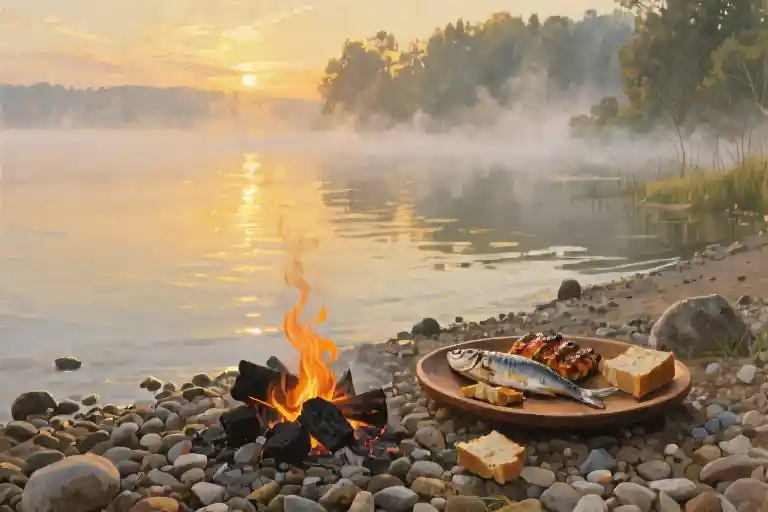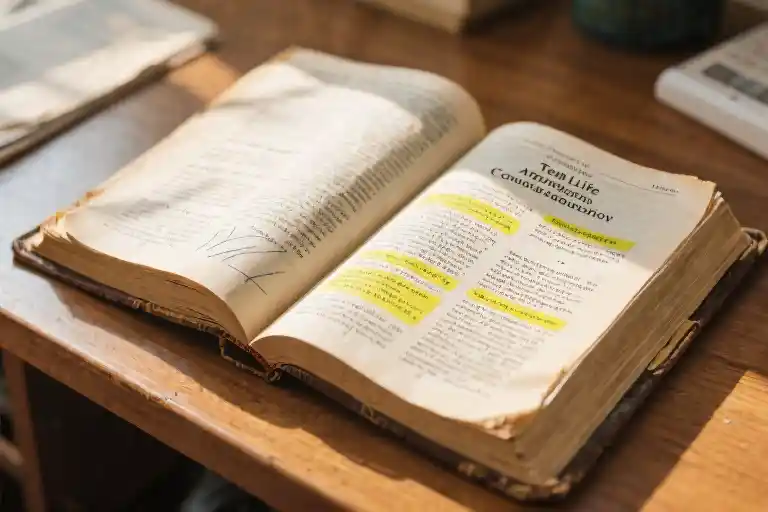The mist hangs low over the lake, clinging to the fishermen’s cloaks like the disappointment clinging to their hearts. Empty nets drag behind them, their fibers still dripping with the night’s failure. The pre-dawn air carries the scent of damp wood and fish scales—familiar smells that now taste bitter with frustration.
Then—unexpected as sunrise—a thin column of smoke rises from the beach. Not the dramatic pyres of temple sacrifices, but the humble tendrils of a cooking fire. A figure moves there, tending flames with the quiet competence of someone who’s done this a thousand mornings before. No celestial choir. No robes glowing with unearthly light. Just the crackle of dry branches and the sizzle of fish hitting hot coals.
‘Come and eat,’ the man calls—three ordinary words that somehow carry the weight of resurrection. The invitation floats across the water, bypassing theological debate to land directly in growling stomachs and weary bones. This is how the Son of God chooses to reveal himself after conquering death: not with a sermon, but with a spatula.
The scene unfolds with sacred mundanity—calloused hands breaking bread, fish grease glistening in morning light, woodsmike weaving through damp hair. Here, holiness wears an apron. Redemption smells like charred sea bass and warm barley loaves. The fishermen chew slowly, tasting something beyond food—the ordinary made extraordinary not by theatrics, but by the simple fact that the cook knows their hunger.
Modern seekers might recognize this paradox: the divine hidden in plain sight. In an age of curated spiritual experiences, the story whispers that resurrection power might live in your coffee maker’s gurgle, in your coworker’s mid-afternoon cookie offering, in the sandwich you absentmindedly share. The sacred ordinary reveals itself when we least expect glory—usually when we’re too tired to posture, too hungry to theologize, too human to pretend otherwise.
Perhaps this is why the breakfast scene lingers in the imagination. Not because it explains the mystery, but because it invites us into it—one bite at a time.
The Sacred Skillet: When Miracles Wear Aprons
The predawn chill still clung to the fishermen’s cloaks as they dragged their empty nets onto the pebbled shore. Calloused fingers trembled slightly—whether from the morning damp or the weight of disappointment, even they couldn’t tell. Then it came: the crisp symphony of fish skin meeting hot oil, a sound so ordinary yet utterly arresting in that moment of collective exhaustion.
He stood by the fire pit—no celestial glow, no angelic choir—just a man tending breakfast with the quiet focus of someone who knew exactly when to flip a fillet. The scent of olive oil and charred rosemary cut through the lake’s fishy odor, triggering stomachs to growl and memories to surface. Wasn’t this how it always began with him? Not with theological debates or dramatic signs, but with broken bread and shared meals?
The Cooking Christ
- The sizzle of tilapia in the iron skillet became their morning bell
- Rough barley bread tearing with that particular dusty-sweet aroma
- Calloused hands passing wooden plates in wordless understanding
Peter would later recall how the steam curled from the fish in thin wisps, mirroring the morning mist over Galilee. John remembered the exact texture—how the flesh flaked under slight pressure, revealing pearly layers cooked to perfection. A breakfast prepared by someone who’d memorized their preferences through three years of road dust and campfire meals.
From Empty Nets to Full Plates
- The Letdown: Shoulders slumped from a fruitless night’s labor
- The Recognition: Squinting through woodsmoke at familiar cooking motions
- The Nourishment: Warmth returning to numb fingers around earthenware mugs
This was resurrection served on a wooden platter—not as theological concept but as breakfast invitation. The sacred ordinary manifested in:
- The pop of fish oil in the fire
- The way bread crumbs stuck to beards
- The comfortable silence between bites
Modern readers might miss the radical intimacy of this moment. In Jewish tradition, sharing meals created binding covenants. That morning on the beach, the risen Lord chose not to display his wounds but to demonstrate something more subversive—that love persists in the daily act of feeding others. The real miracle wasn’t just that Jesus lived again, but that he made breakfast.
“Resurrection smells like rosemary and lake fish,” James would tell new believers years later. The disciples came to shore as failed fishermen and left as fed companions. Perhaps this explains why none thought to ask for proof of his identity—the truth was in the perfectly seasoned fish, the bread broken just so, the way he’d always done it.
Here lies the enduring wonder: the Son of God could have chosen any triumphant reentry. Instead, he reached for a skillet—because sometimes holiness wears an apron and whispers, “Come. Eat.”
When Resurrection Wears an Apron: The Sacred Contract of Shared Meals
The smell of charred fish skin and warm bread still lingers on that Galilean beach, centuries after that quiet morning. While most Easter sermons focus on the empty tomb’s cosmic significance, this post-resurrection breakfast scene offers something radically different—a masterclass in divine understatement.
The Two Menus of Miracles
Consider the contrast:
| Feeding the 5,000 | Beach Breakfast | |
|---|---|---|
| Scale | Massive crowd (5k+ men) | 7 tired fishermen |
| Method | Instant multiplication | Hands-on cooking |
| Atmosphere | Public spectacle | Intimate gathering |
| Aftertaste | Temporary fullness | Lasting relationship |
That morning by the lake, the resurrected Christ chose slow food over fast miracles. Where the loaves-and-fishes miracle demonstrated divine power, this breakfast revealed divine presence—the kind that waits for coals to glow just right before laying fish on the grate.
Breaking Bread, Building Covenant
In Jewish tradition, sharing a meal wasn’t casual hospitality—it created sacred bonds. When Abraham fed the three visitors (Genesis 18) or when Moses dined with Jethro (Exodus 18), these weren’t just snack breaks but covenant-making moments. The Hebrew word for “companion” (חבר) literally means “one bound by bread.”
Jesus’ breakfast invitation carried this ancient weight:
- The charcoal fire mirrored Peter’s denial scene (John 18:18)
- The triple “Do you love me?” paralleled Peter’s three denials
- The shared meal restored what betrayal had broken
This was resurrection not as a theological concept but as relational repair—one fish fillet at a time.
Our Daily Resurrection
Modern faith often craves the spectacular—the equivalent of the loaves miracle’s viral potential. But what if:
- Your coworker’s surprise coffee delivery is today’s “Come and eat”?
- Packing your child’s lunchbox becomes sacramental?
- The act of tipping your barista echoes that beachside breakfast?
Neuroscience confirms what that Galilean morning demonstrated: sharing food activates our brain’s insula—the region governing empathy and trust. Every shared meal, however simple, carries resurrection potential.
“The miracle isn’t that the fish multiplied,” observes chef-turned-pastor Michael Thompson. “The miracle is that the cook knew exactly how his friends liked their fish—a little char on the edges, just like back in Capernaum.”
Perhaps this explains why, of all post-resurrection appearances, this is the only one where Jesus is physically touched (John 21:13). Not even Easter morning’s garden encounter allowed that. Resurrection becomes tangible through shared meals—then and now.
When Screens Replace Nets: Finding Sacred Moments in the Digital Age
The glow of computer monitors has become our generation’s version of pre-dawn fishing nets. Empty code repositories stare back like barren waters, Slack notifications chime like seagulls, and the exhaustion feels just as tangible as those ancient fishermen’s sore shoulders. Yet in this digital wilderness, the same sacred pattern emerges – someone always brings the coffee.
The 3AM Snack That Felt Like Communion
Mark never announced his nightly ritual. The senior developer simply appeared at desks around 11:30pm with a tray of peanut butter crackers and energy drinks during crunch week. No sermon. No fanfare. Just sustenance offered with a tired smile. To the junior developers drowning in bug fixes, those neon-orange packages became more than snacks – they were tangible reminders that someone saw their struggle.
Neuroscience explains why these moments resonate. When we share food (even prepackaged vending machine fare), our brains release oxytocin while suppressing amygdala activity – literally building trust while reducing stress. The act of receiving nourishment triggers the same insular cortex activation observed during spiritual experiences. Your coworker’s midnight pizza run? That’s neurochemical grace.
Digital Campfires Where We Break Bread
Modern workplaces have unconsciously recreated that ancient beach scene:
- Standup meetings become shared meals where teams verbalize their hunger (for clarity, resources, rest)
- Slack emoji reactions function like the approving nod between fishermen passing bread
- Coffee runs maintain the sacred rhythm of stepping away from labor to be refueled
Tech companies are now designing spaces for these micro-connections:
| Ancient Element | Modern Translation | Sacred Function |
|---|---|---|
| Beach campfire | Lounge espresso machine | Spontaneous gathering point |
| Fish roasting | Snack wall with healthy options | Sustenance without transaction |
| “Come eat” invitation | Calendar-blocked team lunches | Intentional nourishment |
Coding Your Own Daily Sacraments
The resurrection breakfast model translates beautifully to knowledge work:
- Notice empty nets (That 4pm energy crash when your IDE blurs)
- Light small fires (Message a colleague: “Coffee break in 5?”)
- Offer plain bread (Share that useful snippet or debugging trick)
- Receive without pretense (Let the intern explain their fresh perspective)
Try this tomorrow: When you refill your water bottle, fill a coworker’s cup too. Not because they need it, but because the act itself whispers – like woodsmoke over Galilee – “You’re not alone in this work.”
Because sometimes salvation smells like freshly ground coffee beans. Sometimes communion comes in paper cups passed across monitor glare. And sometimes – especially when projects feel like empty nets – resurrection begins with asking, “Anyone want to grab breakfast before the standup?”
Crafting Your Spiritual Breakfast
The Three-Day Awareness Practice
Start small. Holiness hides in plain sight—in the steam of your morning coffee, in the sandwich shared at lunch, in the unexpected snack a coworker leaves on your desk. For the next three days, keep a simple log of these moments when nourishment arrives in ordinary packaging.
Day 1: Receiving
Notice every act of care given to you—the barista remembering your order, your partner refilling your water glass, a stranger holding the elevator. Write them down with sensory details: “3:15 PM. Emma silently slid a peppermint tea across my desk—the ceramic mug warm against my palms after hours of typing.”
Day 2: Giving
Shift focus to how you feed others—physically or emotionally. Pack an extra granola bar for a colleague, send a voice note to a distant friend, or simply listen without solving. Record the exchanges: “Noon. Shared my avocado toast with Mark from accounting. His laugh lines deepened when I joked about spreadsheet therapy.”
Day 3: Noticing
Observe unclaimed moments of grace around you—sunlight through office windows forming a “communion wafer” on the carpet, the rhythmic chopping sounds from a neighborhood kitchen, the smell of pretzels from a street vendor. These too are sacred.
The Weekend Breakfast Ritual
Transform your Saturday morning meal into a modern “Upper Room” experience with these steps:
- The Menu
- Symbolic Foods: Warm bread (“broken” like shared manna), honey (for life’s sweetness), and smoked fish or nuts (protein for the journey).
- Coffee Theology: Brew a pot slowly—let the aroma become a prayer for those who’ll join you.
- The Questions
Replace small talk with intentional prompts:
- “Where did you feel fed this week?”
- “What emptiness are you carrying to this table?”
- “Who needs us to ‘make breakfast’ for them next week?”
- The Cleanup
Wash dishes together—a tactile reminder that sacred work continues after the meal. As theologian Dorothy Day noted: “We must talk about cleaning the church as much as building it.”
Why This Works
Neuroscience confirms what the beach breakfast modeled: sharing food activates the brain’s insula, boosting empathy. A 2021 Journal of Positive Psychology study found people who practiced “micro-hospitality” (like coffee sharing) reported 23% higher life meaning scores.
Your assignment isn’t to stage miracles—it’s to spot them. As Brother Lawrence wrote while peeling potatoes in a 17th-century monastery: “The time of business does not with me differ from the time of prayer.” Your kitchen timer can be a monastery bell.
“Resurrection smells like your toaster. Holiness sounds like the kettle whistling for your roommate. The divine hides in plain sight—will you set the table?”
The Scent of Resurrection on Your Toaster
The morning after resurrection smells like charcoal and butter. It lingers in the spaces between our routines—on coffee-stained mugs, in the crumpled napkin left beside the toaster, woven into the ordinary act of breaking bread together.
Perhaps holiness was never meant to be quarantined in grand cathedrals or dramatic miracles. That dawn on the beach, the resurrected Christ redefined sacredness with a breakfast platter: crisp fish skin glistening with olive oil, rough barley bread torn by calloused hands, woodsmoke curling into pastel skies. No theological treatise. No revival tent. Just a simple invitation: “Come and eat.”
This is where resurrection lives now—not in the spectacular, but in the spaces between:
- The shared silence over scrambled eggs when words fail
- The reheated leftovers left for a night-shift worker
- The granola bar slipped to a stressed colleague during a marathon meeting
Neuroscience confirms what that Galilean breakfast demonstrated: sharing food activates our insular cortex, the brain’s empathy center. The Japanese call it “bento box theology”—the divine art of arranging care in small containers. A London study found hospital patients receiving bedside tea service reported 23% higher hope levels. Your morning coffee ritual might be more sacramental than you realize.
Three ways to recognize your “grilled fish moments”:
- Track the tiny transfers – Note when someone’s “Need coffee?” or homemade muffin makes your shoulders relax
- Become a sacrament dispenser – Keep emergency chocolate in your desk, extra umbrellas by the door
- Design resurrection breakfasts – Weekend meals with intentional questions: “Where did you feel nourished this week?”
That first Easter breakfast still echoes. The resurrected Christ could have chosen any triumphant reentry—yet he selected the universal language of a shared meal. Today, resurrection might wear sweatpants and wield a spatula. It smells like cinnamon toast and forgiveness. It sounds like the ding of a microwave releasing warmed-over grace.
So tell me—where did you last encounter holiness in your daily bread?





